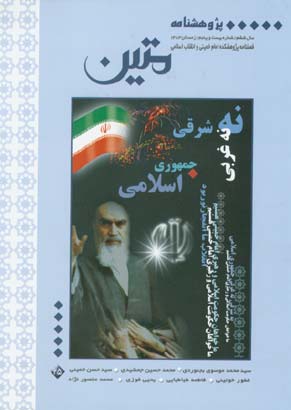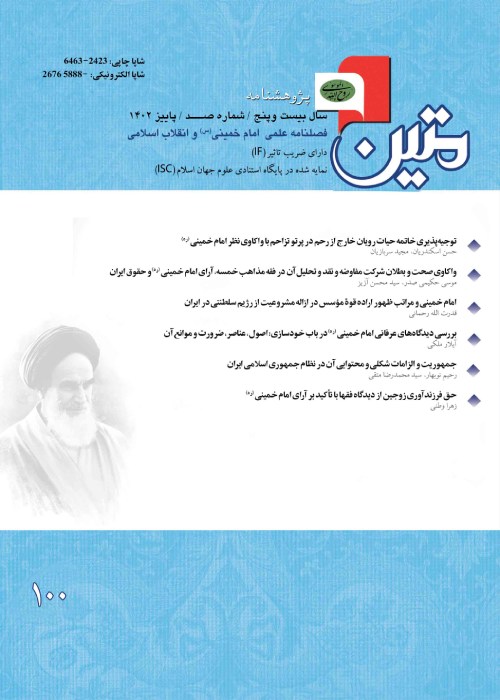فهرست مطالب

پژوهشنامه متین
پیاپی 25 (زمستان 1383)
- 144 صفحه، بهای روی جلد: 7,500ريال
- تاریخ انتشار: 1383/12/15
- تعداد عناوین: 8
- پیام متین
-
صفحه 1
- مقالات
-
صفحه 3یکی از مسایی که به خصوص در احکام نماز و روزه مطرح می شود این است که هنگام نماز صبح و امساک برای روزه چه زمانی است. این مساله وقتی که با ایام خاص، مثلا شبهای مهتابی، مقارن شود از حساسیت بیشتری برخوردار می گردد. نویسنده دراین مقاله با بررسی آیه و روایاتی که در این خصوص وارد شده است، به بررسی آغاز و پایان وقت نماز صبح می پردازد و در انتها با بیان آرای حضرت امام در این مورد و ارائه روایات مطرح شده از جانب ایشان، نظر خویش را در مورد وقت نماز صبح درشبهای مهتابی بیان می دارد.کلیدواژگان: طلوع فجر، فجر صادق، فجر کاذب، خط افق، روزه، نماز، نماز صبح، تبین، شبهای مهتابی، رودخانه جوشان
-
صفحه 15با توجه به تحول در زاویه دید ما نسبت به غرب و وضعیت جهان معاصر، ضرورت اتخاذ موضعی متناسب با ارزشهای انقلاب اسلامی و هویت ایرانی - اسلامی به وضوح آشکار می گردد. امام خمینی به عنوان ایدئولوگ و رهبر انقلاب اسلامی و بنیانگذار جمهوری اسلامی رویکردی را نسبت به غرب مطرح می سازد که کمابیش با کلیت فرهنگ ما سازگار و هماهنگ است. چنین رویکردی با نفی غرب بر مبنای شاخصها و اصول نظری آن چون اومانیسم، ماده گرایی و سکولاریسم، ناسیونالیسم، اصالت فرد و سلطه محوری به طرح احیای شرق و قیام و ایستادگی مردمانش در برابر غرب با توکل بر مبداء جهان هستی و با اتکای به خود می پردازد. بر اساس این طرح، غرب، مغرب حقیقت قدسی و شرق، اشراق حقیقت و تجلی نور خدا است. در چنین طرحی انسان به خویشتن حقیقی یا فطرت خداگونه و مخموره خود باز می گردد و بدین سان به سوی کمال و سعادت حقیقی گام بر می دارد.کلیدواژگان: غرب، غرب زدگی، اومانیسم، اثبات گرایی، عقل گرایی، استعمار، شرق، ناسیونالیسم، لیبرالیسم، بازگشت به خویشتن
-
صفحه 43یکی از مسائل علم کلام که به طور استطرادی در علم اصول مورد بحث قرار می گیرد «کلمه توحید» یا «لا اله الا الله » است. در این مقاله، پس از توضیح کوتاهی در مورد مفهوم استثناء، در خصوص معانی مختلف حرف «لا» و همچنین امکان حذف خبر آن بحثی مطرح می شود تا محل نزاع و اشکال در مورد کلمه توحید مشخص گردد. در وهله بعد، نگارنده دیدگاه علمای مختلف، بویژه امام خمینی، را در پاسخ به این اشکال مطرح ساخته و در پایان بهترین نظر را بر می گزیند.کلیدواژگان: کلمه توحید، الله، اله، شهادت، واجب الوجود، توحید در ذات، توحید در صفات، توحید در عبادت
-
صفحه 55دیدگاه اعلامیه حقوق بشر که زاییده فلسفه های سیاسی سده های هفدهم و هجدهم میلادی است - هر چند آنها هم ریشه در حقوق طبیعی دارند - به طو موکد بر آزادی های اندیشه و عقیده تاکید دارد و خواستار به اجرا گذاشته شدن آن در جوامع جهانی است. شکل گیری انقلاب اسلامی در عصر اخیر با ماهیتی ایدئولوژیکی و دینی این سوال را در اذهان پدید آورد که آیا اسلام و به تبع آن انقلاب اسلامی با آزادی اندیشه و عقیده سر سازگاری دارد یا خیر؟ شاید طرح این پرسش به لحاظ سابقه تاریخی عملکرد کلیساها در قرون وسطی موجه جلوه می کند. در نوشتار حاضر با توجه به حجم و مجال آن، تلاش شده است تا با تبیین حقوق اسلامی در مورد این دو مقوله از آزادی بپردازیم و دیدگاه دینی اندیشه های انقلاب اسلامی و بنیانگذار آن را مورد امعان نظر و توجه قرار دهیم.کلیدواژگان: آزادی فردی، آزادی اجتماعی، آزادی معنوی، آزادی اندیشه، عدالت
-
صفحه 65انسان موجودی پژوهشگر، پرسش کننده و پاسخ طلب است. همواره در پی پرسش از علم، عالم، معلوم، اغراض، نتایج و ارزش گذاری علم است و هنگامی این حالت در او اوج می گیرد که «علم» را با دو صفت متضاد «نور» و «حجاب» متصف می بیند. به همین دلیل می خواهد بداند چگونه حقیقتی که «الظاهر لذاته و المظهر لغیره»اش می دانند، می تواند حجاب، آن هم حجاب اکبر باشد. در این نوشتار نخست، از کاربرد علم در دو معنی (علم عام و مطلق) و (علم خاص و تخصصی) که همان دانش متکی بر تجربه و آزمون است، سخن گفته و سپس به آرای برخی از بزرگان اندیشه و معرفت که «علم» را مساوق «وجود» و «نور» دانسته اند، اشاره کرده ایم. محور اصلی بحث، نظریه های عارفانه امام خمینی (س) است که «علم» را از شئون فطرت دانسته و آن را به وجهه نورانی وجود موجودات منتسب می دانند و بر این باورند که تمام موجودات متناسب با حدود وجودی خود مظهر اسم «علیم» حضرت حقند؛ راز تسبیح موجودات و نیز رمز جاودانگی و ملکوتی شدن انسان را در علم و آگاهی بیان می دارند. علم حقیقی را «طریق جنت» و هر مرتبه ای از این علم را متناسب با مراتب بهشت (افعال، صفات، ذات) می دانند و ازآیات نخستین سوره علق نکات زیبا و تازه ای در بیان ارزش و منزلت علم مطرح می نمایند که به طور مختصر به آن پرداخته ایم.کلیدواژگان: علم، علم حقیقی، متعلق علم، عالم، نور، حجاب
-
صفحه 89علل رخداد انقلاب اسلامی در ایران را می توان در دو دسته عمده، یعنی علل ساختاری و علل ارادی مورد بررسی قرار داد. علل ساختاری را می توان عنوان علل دراز مدت و میان مدت و علل ارادی را علل کوتاه مدت و شتابزا نامید. در این مقاله تنها به بررسی عوامل ارادی مهم می پردازیم که منجر به رخداد انقلاب در ایران شد و در این ارتباط به عواملی همچون نقش امام خمینی به عنوان رهبر انقلاب، نقش ایدئولوژی انقلاب و نقش بسیج مردمی در انقلاب اسلامی ایران اشاره خواهد شد.کلیدواژگان: انقلاب، انقلاب اسلامی، ایران، امام خمینی، ایدئولوژی، بسیج مردمی
-
صفحه 117نوشتار حاضر عهده دار بررسی تطبیقی بحث ذومراتب بودن آدمیان از دیدگاه امام خمینی و غزالی، به عنوان یکی از مبانی انسان شناسی اندیشه سیاسی این دو اندیشمند احیاگر است و مباحث آن در راستای مدلل نمودن این فرضیه اند که: «در حالی که اندیشه سیاسی غزالی در پارادایم اندیشه سیاسی سنتی تحلیل پذیر است، اما اندیشه امام خمینی از شاخصهای اندیشه سیاسی سنتی تحلیل پذیر است، اما اندیشه امام خمینی از شاخصهای اندیشه سیاسی سنتی فراتر می رود».کلیدواژگان: محمد غزالی، ذو مراتب بودن انسانها، انسان شناسی اندیشه سیاسی، فرقه باطنیه، فرقه اسماعیلیه
-
Page 3One of the main issues pertaining to the principles of daily prayers and fasting is the time of the morning prayers and refraining from eating and drinking to prepare for fasting. The issue becomes complicated when it overlaps with the moony lights. The present article is an attempt to study the issue in the light of the verses and traditions and finally elaborate on the ideas of Imam Khomeini about the daybreak during the moony lights.
-
Page 15Given the change in our approach to the West and the condition of the contemporary world, it is necessary to take an appropriate stance concomitant with the Islamic values and Iranian-Islamic identity. As the leader, founder and ideologist of the Islamic Revolution, Imam Khomeini advanced an approach, which was more or less congruent with our culture. This approach rejects the West on the basis of its main features and such theoretical principles as humanism, materialism, secularism, nationalism, individualism and power-centeredness and in lieu of that introduces the idea of revival of the East and uprising of its peoples against the West by trusting in God and themselves. On the basis of this plan, the West is the sunset of sacred truth and the East the sunrise of truth and manifestation of the divine light. In this plan man returns to his true self, which is divinely and Godly and thus moves towards true perfection and felicity.
-
Page 43One of the topics of the theology which is discussed in the discipline of Usul is the word of monotheism or the phrase La ilaha illallah (There is no god, but God). The present article is an attempt to explain the concept of exception, the meanings of the letter “la” as well as the possibility of the elimination of its news in order to shed light on the questions and queries about the word monotheism (unity). Attempts have been made in this article to advance the viewpoints of the ulema particularly those of Imam Khomeini about the said questions and queries.
-
Page 55The Declaration of Human Rights, which is the outcome of predominant political philosophy of the seventeenth and eighteenth centuries – though rooted in the natural rights –lays strong emphasis on the freedom of expression and faith and seeks the implementation of these rights in the world societies. The formation of the Islamic Revolution in recent years with an ideological, religious nature raised the following question: Is Islam and consequently the Islamic Revolution compatible with the freedom of thought and faith? Probably the historical record of the church in the medieval ages justifies such a question. The present article is an attempt to shed light on the Islamic law’s stance on the said two categories of freedom and also to elaborate on the viewpoints of the founder of the Islamic Revolution on these issues?
-
Page 65Man is a curious, questioning being who seeks answers to his questions. He is always after questioning knowledge, scholars, the known, intentions, results and values of knowledge and these conditions peak up in him when he finds knowledge with two contradictory attributes, that is, light and veil. Hence he wants to know how a truth that is considered “clear in its essence and clearer for others” can become a veil, indeed the greatest veil. The present article discusses various categories of knowledge, that is, the general and absolute knowledge and specific and specialized science, which is experimental knowledge based on experiment and test. Also reference has been made to the ideas of some scholars who consider knowledge coextensive with being and light. The main focus of this paper is the gnostical ideas of Imam Khomeini who considers knowledge a feature of primordial nature, attributing it to the illuminated aspects of the being of creatures. Imam Khomeini also maintains that all beings concomitant with the limits of their existence are the manifestation of the All-Knowing (Alim), a Name of the Lord. He also maintains that knowledge and awareness are the keys to the creatures’ praise for the Lord and the secret of man’s eternalization and celestialization. He maintains that true knowledge can be acquired through the heaven and any grade of this knowledge is concomitant with the grades of heaven (deeds, attributes, essence). He also maintains very suave points from the Alaq Chapter of the holy Quran on the value and status of knowledge.
-
Page 89The factors responsible for the occurrence of the Islamic Revolution may be divided into two categories: the structural and the voluntary factors The structural factors may be also called the long-term and mid-term factors while the voluntary factors may be called the short-term and expediting factors. The present article is an attempt to discuss the significant voluntary factors, hich led to the Islamic Revolution. Also such factors as the role of Imam Khomeini as the leader, the role of the ideology of the revolution and the role of the popular mobilization in the revolution are discussed.
-
Page 117The present study is an attempt to comparatively study the viewpoints of Imam Khomeini and Ghazzali on the gradation of human beings as a fundamental anthropological principle of the political ideas of these two revivalist thinkers. Attempts have been made in this article to test the following hypothesis: While the political idea of Gazzali can be analyzed within the paradigm of traditional political thought, Imam Khomeini’s political thought goes beyond the paradigm traditional political thought.


